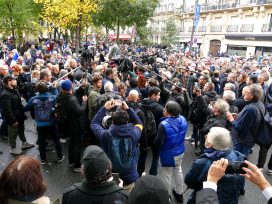Abstracts Esprit 7/2005
MARIUS SCHATTNER
Greater Israel: A mutating mirage
The Israeli withdrawal from the Gaza Strip scheduled for mid-August is neither a matter of military security nor some conscientious political arbitrage by Ariel Sharon. Territory is the substantial issue, the significance of which is central to both the history of Zionism and the theology of Judaism.
JACQUES DONZELOT
Inventing under-employment (An interview with ROBERT CASTEL)
Stubborn, massive unemployment goes hand in hand with a frittering away of the salariat. The classical, protective type of employment is crumbling away, and policies of welfare support for unemployment can only manage to bring about an in-between sort of situation – namely, under-employment – which is neither unemployment nor a well-protected salariat.
MARC-OLIVIER PADIS
France turns insular
When he said he was determined to fight for the “French social model”, Jacques Chirac was acknowledging the country’s rejection of the EU constitutional treaty. But then, what exactly does that mantra-like phrase mean, as the French model – a sort of substitute for social democracy – remains ill-defined and shifting?
JEAN-CLAUDE BARBIER
Any lessons from Denmark? Reflections on the “Danish miracle”
Whereas some in France believe that Danish-type policies that mix flexibility with security can be imported into France, this study shows that they are practicable only in a specific political and welfare system, several foundations of which are missing in France.
OLIVIER MONGIN
When opinion democracy weighs in: Disavowal of reform and the fickleness of political discourse
Those calling for a return to substantial political debate should reflect on our ability to deliberate and discuss. With opinion democracy and political hype that favours individual gamesmanship and systematic rejection of reform prospects, today’s political vocabulary is devalued currency. Now, for all its “rhetorical” nature, the medium for politics is a discourse that can be merged neither with individual opinion (“I think that”) nor with the knowledgeable discourse of the experts.
ZYGMUNT BAUMAN
The uses of fear in globalization (An interview)
Far from spreading uniformity across the world, globalization results in a segmentation of space and mounting fears. Against this background, how can we conceive of an alternative, positive type of globalization that would not imply the dismantling of welfare policies – which, to this date, have only been mapped out within the confines of the nation-state?
MICHAËL FSSEL
From guilty man to capable man
Having been perceived for too long as only a great scholar who could weave various traditions, disciplines, and cultures together, Ricur gradually built a major body of thought of his own, of which Soi-même comme un autre (Oneself as Another) provides a robust exposé. Recognizing him as a full-blown thinker must not obliterate his active presence alongside several generations and various forums, first and foremost Esprit.
PAUL RICUR
The scandal of evil
The moment he started reflecting on the voluntary and the involuntary, Ricur grappled with the enigma of evil. Although the issue brings together the biblical tradition and philosophy, it does not lead to wholesale endorsement of a theodicy, but rather to developing a reflection on action. In Ricur’s book, being means action rather than substance, since a confrontation with evil requires a commitment to action.
JEAN GREISCH
Incompleteness as achievement
This contribution is the transcript of an address made at the Oratory temple in Paris following Paul Ricur’s demise. The author revisits the closing lines of On Memory, History and Forgetting, the very last word of which is “incompleteness”.
PAUL RICUR
Becoming capable, being recognized
This address was recorded on video for the Kluge Prize ceremony in the United States and is one of the ultimate occasions when Paul Ricur was able to put pen to paper. He focuses on the notion of capability, which, as was his wont, he develops from a conceptual point of view before he relates it to the notion of recognition.
PHILIPPE DE LARA
Autonomy as apprenticeship
Descombes’ latest book, le Complément de sujet (2004), is an inquiry into the philosophical issue of the subject, which gives rise to a dispute over structuralism. Today, Descombes also takes sociology to task over the occasionally inconsistent notion of the subject’s autonomy.
VINCENT DESCOMBES
A philosophical itinerary (An interview)
As he looks back on his work, Descombes pinpoints his indebtedness to American influences as well as to Cornelius Castoriadis, for his political thinking, and to social anthropologist Louis Dumont, who dragged him into areas that had remained out of bounds as far as French philosophy was concerned.
FRANÇOISE GAILLARD
Proust and the quest for truth
To Vincent Descombes, Proust’s purpose in Remembrance of Things Past is not to create a work of art per se, but rather an elucidation of truth through our discourse and our actions. How does the novel stage the philosophical quest for the truth?
BRUNO KARSENTI
Social philosophy and the subject
Can we “act out of our own selves”? Do our actions in the community or in the political sphere take on a specific configuration that would put a limit on our autonomy? How then is Descombes’ political philosophy to be understood?
IRÈNE THÉRY
The spirit of institutions
What is in Descombes’ philosophical inquiry for the sociologist? He warns against any naïve antagonism between the individual and society, and calls for a fresh look at the relationships that bring people together within the community.
ALAIN EHRENBERG
Acting out of one’s own self
As sociology has sized up contemporary individualism, it risks reducing its own view of society to a mere meeting or crossing point for individual subjectivities. This view may make it impossible to reflect upon the subject and society at one and the same time.
PHILIPPE URFALINO
Holism and individualism: Clarifying a dispute
Vincent Descombes’ philosophical inquiry makes it possible to revisit the recent history of French sociology and the way in which it currently exhausts the issue of autonomy – an issue that would have been better established by a founding father like Marcel Mauss.
Published 7 July 2005
Original in French
Contributed by Esprit © Esprit
PDF/PRINTNewsletter
Subscribe to know what’s worth thinking about.



